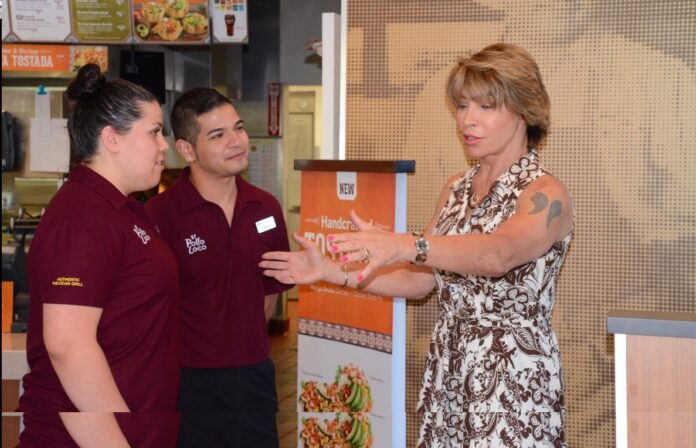Franchisors and franchisees in the San Fernando Valley are sounding the alarm bells about the Fast Food Franchisor Responsibility Act passed by the California State Assembly late last month.
The contentious bill, known as AB 1228, could hold both franchisors and franchisees jointly responsible for liability of employment violations at stores. The new legislation was initially part of what was known as the FAST Act, which was scrapped in an earlier form in September 2022. The Fast Food Franchisor Responsibility Act was reintroduced to the assembly in February and could make California quick-service franchise brands and their independent franchisees with 100 or more locations nationwide share civil liability for violations of labor laws.
“The bill, by jointly including the franchisor and liability for everything we do as franchisees, is really going to turn the model completely upside down,” said Michaela Mendelsohn, an Agoura Hills-based franchisee who owns 13 El Pollo Loco locations across Los Angeles, Ventura, Santa Barbara and San Luis Obispo counties. One of her locations is in Van Nuys, and she has also served as president of the El Pollo Loco Franchise Association for nine years. El Pollo Loco Holdings Inc.’s corporate operations are in Costa Mesa.
Big business
California has more than 15,000 franchised quick-service restaurants, and the majority of the franchised restaurants are locally run and operated by small-business owners. California lawmakers contend that franchisee-owned locations demonstrate higher instances of minimum wage violations than company-owned ones.
Lawmakers also believe the legislation would help employees fight other labor-law issues, such as wage theft, discrimination, sexual harassment and workplace injuries. In the California assembly, the bill passed by a margin of 42-22; 16 members did not vote on the measure. But according to a report from the Employment Policies Institute released in August, limited-service restaurants accounted for 1.6% of total average wage claims filed annually with the state Division of Labor Standards Enforcement from 2017 through 2022. That is less than the industry’s 3.2% share of the overall employment in California, and numbers remained steady even during the pandemic.
“I don’t doubt that some people have had some serious issues, but the [labor protection] laws here [in California] are excellent,” said Mendelsohn. “I’d like to see better education for employees, mandatory education that teaches them how to use the protections that are already in place. Secondly, we need better enforcement; it takes too long after a claim is made, sometimes it takes years to come through the system. That’s not going to be helped by these laws.”
A poll released in June from Oxford Economics found that California franchised restaurant owners oppose AB 1228, with 92% saying they are “strongly” opposed; in addition, 98% believe the law would interfere with their freedom to run their businesses independently.
Franchisees seek freedom
Mendelsohn pointed out that there are more than 10,000 franchisees in Southern California and that on average they own two stores.
“There are a few large ones, but many are small businesspeople who have put up their livelihood, pay their mortgage and put their kids through school by working hard in their stores,” she said. “They chose the franchise route because it gave them the freedom.”
According to the International Franchise Association, many franchisees are worried that the legislation will hurt their independence as business owners, increase corporate control on restaurants, hurt jobs and raise prices.
“AB 1228 has the potential to destroy tens of thousands of local franchised restaurants by taking away their independence in favor of corporate control and more government intervention,” said Jeff Hanscom, vice president of state and local government relations at the International Franchise Association. “This will eliminate the equity local restaurant owners have built over decades and take away any future opportunities for franchise business ownership, especially people of color, women, immigrants and other underrepresented communities.”
Franchising is an approach to entrepreneurship for a large number of Americans, with many women and people of color opting into the practice. According to Franchising World, minority franchise ownership rate is 26%, compared to 19% for non-franchised small businesses.
Not only are franchisees up in arms about the provisions of the law, but franchisors may be forced to reconsider their franchising model in California.
“I think this act is very harmful to franchisors,” said Barry Kurtz, who has been practicing franchise law at Encino-based Lewitt Hackman for more than 40 years. “What the act does is create a co-employer situation where it makes franchisors responsible for the actions of its franchisees’ employees. Most franchisors have no control over hiring, firing, discipline, establishing wages. What this law will do will actively make franchisors responsible.”
Kurtz noted, “If I was a franchisor and I looked at it and said, ‘I’m going to have liability now for activities of my franchisees with their employees, why do I need franchisees? I might as well have company stores and have that same liability.’”
The Fast Food Franchisor Responsibility Act comes on the heels of AB 257, also known as the Fast Recovery Act, which was put on a temporary hold in December by a judge at the Sacramento County Superior Court. AB 257 would create a worker representative body with the power to raise wages. Both franchisors and franchisees have argued that AB 257 would unfairly punish the industry with high labor costs and force high prices onto the consumer.
AB 1228 will be reviewed by the California State Senate and, if passed, would move on to the governor’s desk with the potential to be signed into law.
“This would put a whole layer of middle management in place to run the stores for us,” said Mendelsohn. “Eventually, that means the franchisor just won’t franchise and they won’t renew franchises. They might franchise with large corporate conglomerates, but no longer with the small businesspeople.”
